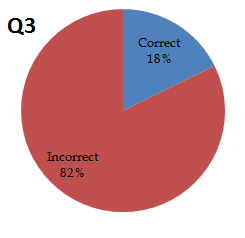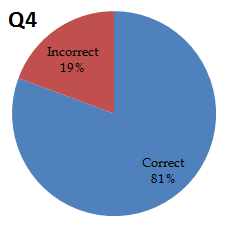Last week I posted this quiz as a fun exercise for pharmacists. I was quite surprised by the results, so I decided to share it with you. I will lay out the answers here with my comments. The results reflect the answers submitted until yesterday afternoon.
This quiz was based mainly on the Medical Council’s statement on self-prescribing.
Spoiler alert! If you haven’t done the quiz yet and would like to, you may want to go there first and come back to this analysis afterwards. It shouldn’t take longer than 5 minutes.
Question 1: You get a prescription written for the prescriber him/herself. What would be the best thing you do?
 Correct answer: “Depends on what it is for and other circumstances.”
Correct answer: “Depends on what it is for and other circumstances.”
This was the most straight forward question and most answered correctly. Some took the bait and went with the answer that purported that such a prescription is a valid legal document, therefore it was okay to go ahead and dispense it.
Question 2: Would it be appropriate to dispense the above prescription if it was for any of the following 3 items?

Correct answer: “TMP 300mg od for 5 days.”
Most got this right as well, but quite a few (about 1 in 5) went for simvastatin. That’s incorrect because according to the Medical Council’s guidelines doctors are not supposed to self-prescribe medication for chronic conditions even when they have been diagnosed by another doctor. My purpose with this question was to highlight that even relatively low risk medicines with zero abuse potential cannot be self-prescribed, in fact, risk has little to do with appropriateness. The Medical Council would like to see all doctors have their own family doctor who is able to objectively diagnose and treat them. However, a short course of antibiotic is acceptable, provided that there are no reasonable alternatives.
Question 3: Would it be appropriate to dispense the above prescription if it was for any of the following 3 items?

Correct answer: “Paracode 500mg+8mg ii qid 40 tabs.”
Judging by the number of wrong answers, I could classify this as a trick question. I had two things in mind when I devised this question. First, there is a small inconsistency between the Medical Council’s statement on self-prescribing and our own guidelines as stated in the Pharmacy Practice Handbook. Our guidelines suggest that “small amounts of codeine/tramadol may be appropriate”, but the Medical Council says that prescribing controlled drugs under these circumstances is never appropriate. My suggestion is that it’s reasonable to allow medicines to be self-prescribed that could be sold without a prescription anyway.
In any case, since the correct answer was so elusive, it’s no wonder that there were so many who went with the inconspicuous Epilim. And this is the second thing I had in mind. I wanted to highlight that there are particular groups of medicines that are never appropriate to be self-prescribed, and antiepileptic medicines are an example of that.
Question 4: What should you do if the prescription is for the doctor’s partner?

Correct answer: “Depends on what it is for and other circumstances.”
The point of this question was to highlight the fact that the rules about self-prescribing apply to prescribing to close relatives and colleagues. Some might have thought that if the prescription is for someone other than the doctor him/herself, then the rules don’t apply.
Question 5: What if you have never seen/spoken to the prescriber before?

Correct answer: “It’s irrelevant because the appropriateness of the prescription depends on other circumstances.”
I must admit, this should also be classified as a trick question, as it turns out. It is quite reasonable to think that it would be considered inappropriate by the authorities to dispense a self-prescribed medicines for a doctor who you don’t know. However, the Medical Council, understandably, have nothing to say about this, and our own professional bodies don’t seem to have an opinion on this question either. So, this leaves us with the conclusion, that the question whether you know the prescriber is irrelevant as to the appropriateness of the prescription. I would add though that this is at least debatable as we don’t have a positive statement on the matter.
And that’s it. I hope you found it informative. Let me know in the comments!